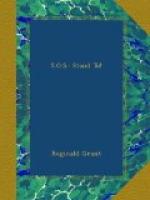The trouble was caused by what is known as a “defective” shell.
I left the gun pit to help Graham over to the dressing station and I had a job on my hands; he was suffering from a bad attack of brain concussion. After attention a couple of Fritzies carried him to the rear.
Returning to the gun pit I found a state of wild confusion among the fellows as to what had really happened. On examination I found it was this defective shell; over to the right of the gun I picked up a chunk of it over a foot long.
Those who remained of our gun crew went that night to the wagon lines, spending a few days there while waiting for our gun to be replaced.
When our gun was replaced I started back from the wagon lines, carrying a piston rod of the buffer, with Downey assisting me. We were on horseback and getting into Labazell Valley, when a shell passed over our head so close that we felt the wind of it; it was accompanied by a great flare over to our right. The shell struck one of our ammunition dumps containing about 50,000 rounds of shells and other explosives, such as rifle grenades, Mills bombs, French mortar bombs, aerial torpedoes, high explosive shells, shrapnel shells, star and gas shells. The disaster resulting from this one single shell was almost inconceivable. It started a fire that gathered strength each second, for all the world like a prairie fire, and the scenic effect was that of a titanic fireworks exhibition. The moon was brightly shining in a clear sky, but the star shells shooting in the air and exploding with a constantly increasing rapidity, the blaze of artificial light quickly obtained ascendency over the mistress of the night; and the shrapnel shells, throwing their contents of danger in all directions, together with the hissing and roaring of all the other exploding missiles of death, formed a diapason of sound that makes one of those wonder-moments that come so seldom in a lifetime.
The reflection of the fire from the explosion was quickly observed by Fritz, and in short order he had his airplanes hovering overhead, and they too were dropping their bombs wherever human activities were noted. We hastily dismounted, tying our horses to the barbed-wire iron pickets in the side of the road, and rushed with a body of men, mostly wagon drivers whose wagons were stalled on the road in the congestion, over to do what we could to save the ammunition which is so badly needed at all times.
In the first rush toward the pile an explosion snuffed out the lives of thirty or forty of the men, knocking the rest of us off our feet like so many nine-pins, besides killing several of the horses on the road, and to add to the already indescribable chaos, several of the horses stampeded, racing blindly into barbed-wire entanglements and adding to the general destruction.




